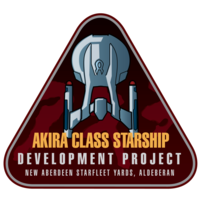Akira class/Design Notes: Difference between revisions
m (fixed link) |
(imported info from the Challenger) |
||
| Line 3: | Line 3: | ||
{{Akira Menu}} | {{Akira Menu}} | ||
[[File:Akira patch.png|200px|center|Akira Class Development Project]] | [[File:Akira patch.png|200px|center|Akira Class Development Project]] | ||
==Armor Development== | |||
The ablative armor system was developed by Starfleet R&D, Tokyo, and the various factors that delayed the deployment onto frontline vessels has been solved. This armor is the second generation of deployed by Starfleet. The armor is still 2cm thick, providing a honeycomb strata of destructible material that reacts violently when exposed to high-end, directed phased energy beams such as phasers, disrupters or polaron beams. The armor melts away in a endothermic reaction, creating a cloud of diffuse molten metal that scatters the coherence of the incoming beam, further enhanced over the Generation I material by the inclusion of gamma-developed Thorium, known for its phased energy reflection properties. | |||
The ''Akira class'' starship has the Ablative Armor placed around the bridge, nacelle mounts, and aft-sail torpedo mount. | |||
The armor works in two stages; in the event of a shield disruption, phaser or energy EM is first dissipated over the hull armor surface, when the classified threshold is achieved, the molecular matrix bakes off, causing it to boil at a controlled rate. The boiling off carries away a large fraction of the energy directed at the vessel, with the rest deflected by the resulting cloud of armor shards. In most cases, the boil-off cloud continues to disperse the incoming beam, negating the higher damage harmonics | |||
==Weapons Development== | ==Weapons Development== | ||
Revision as of 14:58, 25 May 2020
| Utopia Planitia Fleet Yards |
|---|
|
CRUISERS
Armor DevelopmentThe ablative armor system was developed by Starfleet R&D, Tokyo, and the various factors that delayed the deployment onto frontline vessels has been solved. This armor is the second generation of deployed by Starfleet. The armor is still 2cm thick, providing a honeycomb strata of destructible material that reacts violently when exposed to high-end, directed phased energy beams such as phasers, disrupters or polaron beams. The armor melts away in a endothermic reaction, creating a cloud of diffuse molten metal that scatters the coherence of the incoming beam, further enhanced over the Generation I material by the inclusion of gamma-developed Thorium, known for its phased energy reflection properties. The Akira class starship has the Ablative Armor placed around the bridge, nacelle mounts, and aft-sail torpedo mount. The armor works in two stages; in the event of a shield disruption, phaser or energy EM is first dissipated over the hull armor surface, when the classified threshold is achieved, the molecular matrix bakes off, causing it to boil at a controlled rate. The boiling off carries away a large fraction of the energy directed at the vessel, with the rest deflected by the resulting cloud of armor shards. In most cases, the boil-off cloud continues to disperse the incoming beam, negating the higher damage harmonics Weapons DevelopmentThe Akira class starship contained several experimental technologies that would later be rolled out to the fleet and the prequel of later technology. One such technology is a more automated high-speed launcher. The first-generation version of this was found on the New Orleans class and Saber class, before being rolled out to the Excelsior class starships as refit cycles allowed. The Akira-class boasted the second generation of these technologies, which allowed up to 5 tubes per launcher and 15 torpedoes in a single salvo. This would be the basis of the third-generation launcher deployed on the Sovereign class and Norway Class starships. This launcher deployed Mark XXV photon torpedos, but could be configured for either photon or quantum torpedoes.
|
- Black-and-white ship illustrations by Tim Davies unless otherwise noted. Used with permission. All other images are copyright to their respective owners.
- Black-and-white ship illustrations by Tim Davies unless otherwise noted. Used with permission. All other images are copyright to their respective owners.
| REV SD 239705.25 |
|---|



